![How to heal yourself and resolve the health care crisis – Dr. T. Colin Campbell]()
by plant4health | Jun 18, 2015 | cancer, Healing, Nutrition, Plant-based, Vegan, WFPB, Whole food, plant-based
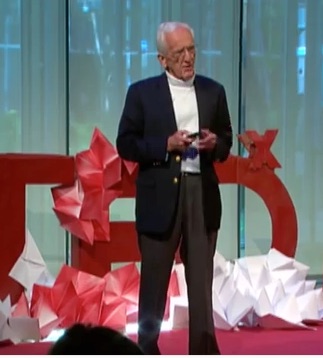 It’s no secret that the United States has a health care crisis. In this TED Talk, Dr. T. Colin Campbell, Professor Emeritus at Cornell University and co-author of several nutrition books including The China Study and Whole, shares his view on how we can each heal ourselves and tackle the health crisis in our country.
It’s no secret that the United States has a health care crisis. In this TED Talk, Dr. T. Colin Campbell, Professor Emeritus at Cornell University and co-author of several nutrition books including The China Study and Whole, shares his view on how we can each heal ourselves and tackle the health crisis in our country.
View the video on YouTube.
Here are some key take-aways from his talk:
(more…)
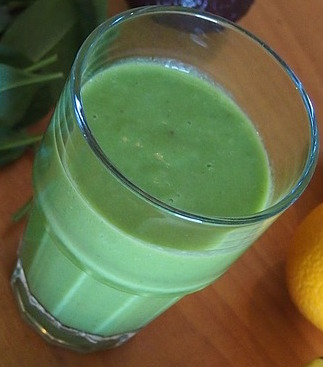
by plant4health | May 28, 2015 | cancer, Nutrition, Plant-based, Recipes, Vegan, WFPB, Whole food, Whole food, plant-based
 While battling cancer, juicing was a vital part of my husband’s nutritional support system and remains an important part of our plant-based diet.
While battling cancer, juicing was a vital part of my husband’s nutritional support system and remains an important part of our plant-based diet.
When your body has developed cancer, or any illness, it is telling you something – its needs are not being met. Your body is a compilation of complex systems that all work together in creating your experience of living. Food provides the fuel all of those interrelated systems require in order to function and maintain health. When one or more of those systems are compromised, we get sick. Reevaluating your eating habits is the first step towards providing your body with the tools it needs to fight disease and regain optimal health.
It’s all about eating consciously. Our bodies have an incredible capacity to heal and your diet is the foundational support system in that healing process. Juicing is a great way to provide your body with much needed nutrients that are easy for your system to absorb.
Juicing Facts:
Nutrient rich – When you drink fresh vegetable juice, highly concentrated vitamins, minerals and enzymes are easily accessible to your body as they rapidly enter the bloodstream. Juice made from fresh produce is high in antioxidants and minerals, wonderful tools in the fight against cancer. Because most of the fiber has been removed, the nutrients can bypass the digestive system and go straight to where you need them most. (more…)
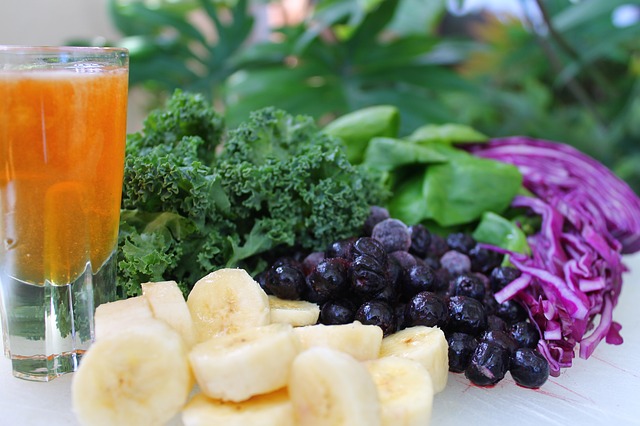
by plant4health | May 21, 2015 | cancer, grocery shopping, Nutrition, Plant-based, Recipes, Vegan, WFPB, Whole food, Whole food, plant-based
 Last week, I was talking with a friend who desperately wants to change her diet but can’t seem to take that first step. According to her doctor, if she doesn’t start making some changes soon, she will be destined for heart disease, stroke, chronic arthritis and/or diabetes as she moves towards her 60s. Over the last few years, she’s gained a few pounds, begun experiencing chronic joint pain, and is battling fatigue as she tries to maintain the high energy her busy lifestyle demands. She went to the doctor thinking her symptoms were signaling the beginning of menopause that hormone therapy might ease, only to learn that she is in the “high risk” category for the most popular illnesses that lead to death and disability in the United States.
Last week, I was talking with a friend who desperately wants to change her diet but can’t seem to take that first step. According to her doctor, if she doesn’t start making some changes soon, she will be destined for heart disease, stroke, chronic arthritis and/or diabetes as she moves towards her 60s. Over the last few years, she’s gained a few pounds, begun experiencing chronic joint pain, and is battling fatigue as she tries to maintain the high energy her busy lifestyle demands. She went to the doctor thinking her symptoms were signaling the beginning of menopause that hormone therapy might ease, only to learn that she is in the “high risk” category for the most popular illnesses that lead to death and disability in the United States.
My friend is not obese nor is she a junk food addict. Actually, before this wake up call, she thought she was living a pretty healthy lifestyle; she always eats a salad with meals, orders whole grains and organic meat when dining out, avoids all fast-foods, and always declines the pastries and sweets offered at business meetings and parties. However, the hidden fats, carbs, salt and sugar from the foods she has been eating, combined with her limited amount of exercise was starting to take its toll.
(more…)
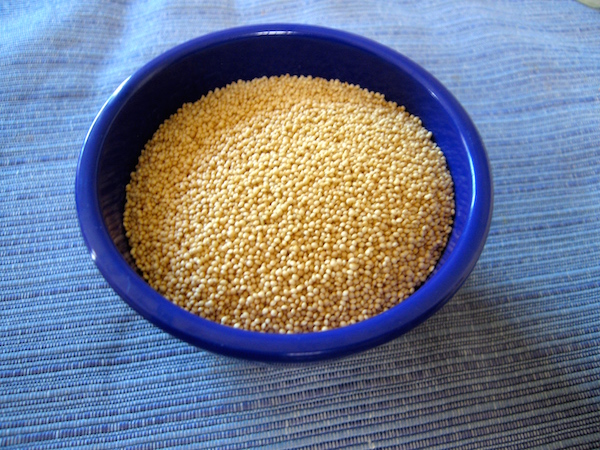
by plant4health | May 14, 2015 | cancer, Nutrition, Plant-based, Recipes, Vegan, WFPB, Whole food
 Recently, I’ve been experimenting with amaranth, both the seed and flour, in my cooking. I enjoy incorporating new textures and flavors into our meals. Amaranth provides a subtly sweet, earthy nuttiness, making it delicious in both sweet and savory dishes. Depending on how you cook it, from crispy chewy crackers to breakfast porridge, amaranth is a wonderful addition to your healing diet.
Recently, I’ve been experimenting with amaranth, both the seed and flour, in my cooking. I enjoy incorporating new textures and flavors into our meals. Amaranth provides a subtly sweet, earthy nuttiness, making it delicious in both sweet and savory dishes. Depending on how you cook it, from crispy chewy crackers to breakfast porridge, amaranth is a wonderful addition to your healing diet.
Amaranth, a major part in the Aztecs’ diet, has been around for thousands of years. It is naturally gluten-free and holds a powerhouse of nutrients. It contains more than three times the average amount of calcium found in grains and is high in protein, iron, magnesium, phosphorus, and potassium (1). Amaranth is also alkaline, making it a wonderful grain for those on an alkaline healing diet.
(more…)
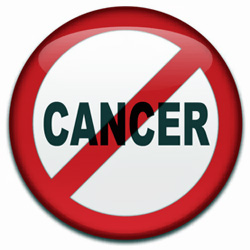
by plant4health | May 7, 2015 | cancer, Whole food, plant-based
I recently learned about the Citizens Health Cancer bill SB. 117 which will be introduced into the California State legislative cycle this year or in 2016. The bill is supported by Frank Cuny who is Executive Director of California Citizens for Health Freedom.
Apparently, physicians across the United States can run the risk of losing their medical license if they recommend options outside of radiation, chemotherapy and surgery for treating cancer patients. Although there are many cases of cancer patients being cured through non-toxic, non-invasive treatments and diet, see Our Journey with Prostate Cancer – A Wife’s Perspective, there is a lack of funding for these alternatives since they can’t be patented like drugs and therefore do not provide a monetary incentive for research. Treating cancer patients with traditional methods is very lucrative for medical centers, doctors, drug companies, and insurance carriers. For example, it is estimated that up to 70% of an oncologist’s income comes from selling chemo drugs and services.
(more…)
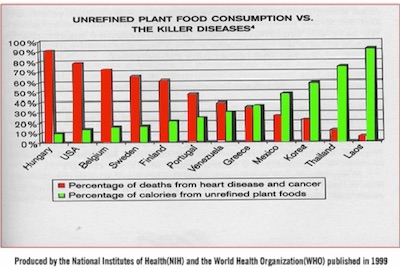
by plant4health | Apr 16, 2015 | cancer, Nutrition, Plant-based, Vegan, WFPB, Whole food, plant-based
Animal products (meat and dairy) promote cancer growth; plant foods prevent and can even reverse it. Regardless of your family history of cancer or other risk factors, you can significantly reduce the chance you will get it by adopting a 100% whole food, plant-based (WFPB) diet.
What is cancer?
Cancer, in which cells in your body mutate, divide and spread, goes through three stages: initiation, promotion and progression. Initiation happens when chemicals capable of causing cancer, called carcinogens, are processed by the liver, turning them from fat soluble to water soluble where they can be excreted from the body. But sometimes these chemicals escape the process and because they are highly reactive, damage molecules like DNA, RNA and protein. If the damaged DNA is not repaired by the body’s immune system, it is permanently changed, causing a mutation. Promotion is when clones of these mutated cells replicate and cluster together over the years. In the progression stage, these clusters, or pre-cancer cells, grow and become tumors. If the tumors invade other tissue or parts of the body, then the cancer has metastasized.
What causes cancer?
In addition to chemicals, there are many factors that can lead to cancer’s development at any of the 3 stages. These include certain viruses, excessive radiation (including from sunlight), nutritional imbalances, obesity, cigarette smoking, alcohol consumption, lack of physical exercise and stress.
Your genes (family history) are often implicated as a risk factor of cancer. However, according to a report published on the National Institutes of Health website, only 5-10% of cancer cases are due to family history, meaning that you are born with mutated genes. But many people suspect that it’s not your genes but how you were raised, the food you ate, the environment you grew up in, etc. that lead to certain cancers running in families. So the good news is that most cancer cases are due to environmental and lifestyle factors – things you can control.
We all have cancer cells that are initiated due to carcinogens, viruses, and lifestyle factors, but a strong immune system supported by proper nutrition can help control whether that cancer develops. Dr. T. Colin Campbell, co-author of The China Study and Whole, has stated that “nutritional imbalances are the most significant causes of cancer” and “…if we have genes that give rise to cancer, we can use nutrition to control the expression of these genes.”
The research:
Lab research conducted by Dr. Campbell showed that high doses of the animal protein casein, which is the primary protein in cow’s milk, promotes chemically induced liver cancer. Rats given a diet of 20% casein had their tumors grow, but when it was lowered to 5%, the tumors shrank. This finding is consistent with earlier research conducted by Indian scientists Madhavan TV, and Gopalan C. in “The effect of dietary protein on carcinogenesis of aflatoxin.” So it turns out that cow’s milk is a carcinogen for humans!
Other findings and experts back up these studies:
What can you do to reduce your cancer risk?
- Adopt a 100% WFPB diet
- Be physically active at least 30 minutes per day
- Maintain a healthy body weight
- Limit supplements, with the exception of Vitamin B12 for those on a 100% WFPB diet, or as recommended by your doctor
- Limit sugary foods and drinks and salty, processed foods
- Limit or avoid alcohol
Although there are no studies proving this, there are theories that “diet-induced acidosis may influence molecular activities at the cellular level that promote carcinogenesis or tumor progression.” See our articles on how to balance your pH.
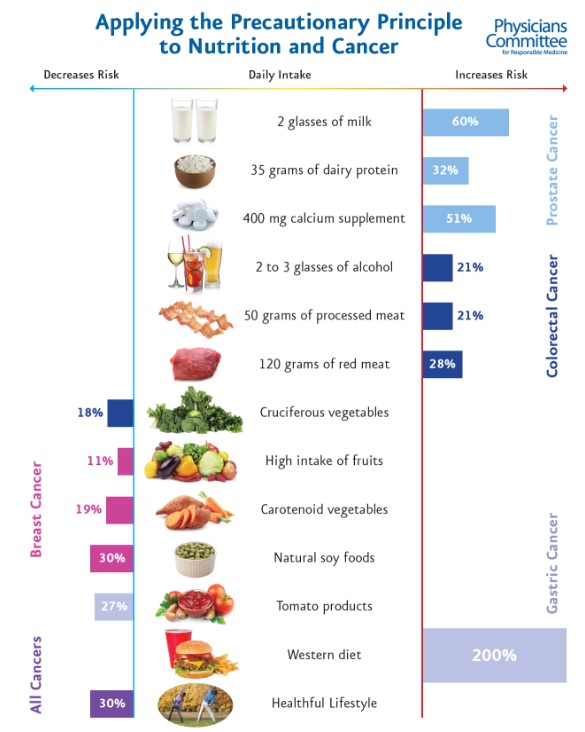 Here’s a link to a great chart published by PCRM about the benefits and risks of certain lifestyle choices and cancer.
Here’s a link to a great chart published by PCRM about the benefits and risks of certain lifestyle choices and cancer.
In summary, regardless of your family history of cancer or other risk factors, you can significantly reduce the chance you will get it by adopting a WFPB diet. You have the power to heal from within!
 It’s no secret that the United States has a health care crisis. In this TED Talk, Dr. T. Colin Campbell, Professor Emeritus at Cornell University and co-author of several nutrition books including The China Study and Whole, shares his view on how we can each heal ourselves and tackle the health crisis in our country.
It’s no secret that the United States has a health care crisis. In this TED Talk, Dr. T. Colin Campbell, Professor Emeritus at Cornell University and co-author of several nutrition books including The China Study and Whole, shares his view on how we can each heal ourselves and tackle the health crisis in our country.





